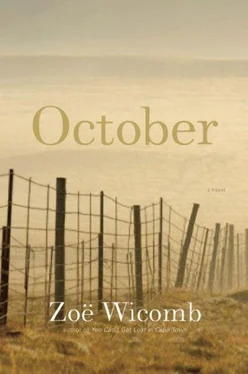Sylvie does not like to think of large, greedy people gulping down fried sausage without so much as pausing to think of time trapped in that skin. Hers is the best boerewors in Namaqualand, all because of the extra dash of coriander and the patience, the waiting for time to do its blending business overnight.
She has finished with the sausage maker, the forcing of flavored, spiced mutton through yards and yards of skin. The same mixture through two different sizes to make thick or thin boerewors, because people are so foolish as to believe one to be better, tastier than the other. The machine is washed, the mincer cleaned and put away, and sausages hang neatly from the hooks on the long steel rod. From the end of the steel pole the iron pail hangs, nice and clean, scrubbed free of mutton fat.
When Sylvie first arrived it was a grungy thing, never cleaned because old Lodewyk said that storing fat did not make it dirty. Yes, she’s made a few changes around here, and all for the better. There was no point in hardening her heart against the place, standing stiffly at the counter, or sulking at having to use the cleaver. Rather, she allowed herself to be drawn into the precision of severing a joint, cracking a rib, turning sheep’s neck into neat chops, getting all to shine and sparkle. Now the place could not be faulted for order and cleanliness.
Sylvie sets up the camera as soon as old Lodewyk leaves wearing his black waistcoat, with a fake leather folder under his arm. The pompous old fool always dresses smartly to go to the bank, as if those boere-meneers would notice. Hardly anyone comes into the shop in the early afternoon; she need not fear any disturbance. A pity about the black doekie that she has to wear bound tightly around her head; she does not think her forehead is rounded enough for such severity, but never mind, there are always ways of flouting the rules, finding pleasure in transgression, even if the ones you trespass against do not know. Sylvie’s black doekies have a secret splash of color, a patterned corner here or there, so that folded, a flash of floral is at the brink of revealing itself. A man, a dull man like old Lodewyk, will never notice. She whips it off, refolds it so that the spray of green leaves shows. A photo needs some color.
AntieMa thinks the doekie is an affront. The Willemse sisters never wore such things; their hair is not of the peppercorn kind that has to be tucked away. What’s wrong with a white polystyrene hat like the boer butchers wear? AntieMa’s objections make it easier for Sylvie to wear the doek. And Lodewyk does not deign to reply. He stomps and grunts. Typical of the Willemses. Full of airs and graces, and never satisfied.
Even if Sylvie says so herself, the sausages look fine, perfectly marbled with the red of mutton and the creamy-white of fat in just the right proportion. Dappled and gleaming, glory be to God. Sylvie sets up the camera and does the customary skip, a little good-luck akkeltjie before its knowing eye, before smiling, calm and composed, holding a rope of perfect sausage in her outstretched arms. In her left hand, the end is lightly pinched between thumb and index finger; the right hand is slightly raised with loops and loops of sausage draped over it. She throws back her shoulder triumphantly — tirrah — smiles broadly, in spite of herself, in spite of the pity of it, of her, Sylvie, the Kool Kat, the Wicked One, the Good Time Girl, beaming in a butcher’s shop.
Her face is lit with pride. Only fear of someone bursting in prevents her from wrapping a length of sausage around her neck. Like a rich silk scarf. For it is a cold winter’s day — people think it doesn’t get cold in Namaqualand but Yissus, it can be bitter. Her fleece is zipped up to her throat. She could toss the length of sausage over her shoulder with the flip of her hand, just so, just like the film star on TV, the one in Egoli . Instead, this tame pose, but never mind, she smiles brightly, if out of breath, and click, click, it’s done.
Think of it as an advert in Huisgenoot . Healthy boerewors for the family, recommended by a healthy, smiling young butcher. Sies-sa-aa! that’s Sylvie. As long as no one mistakes her for a mother.
Sylvie has the perfect idea. Imagine, in the dark. On a summer’s night. Stealing into Lodewyk’s butchery. The moon just about skimming the window so that an eerie, film-set light is cast over everything. Over the streamers of sausage that gleam as moonlight lifts out speckles of shiny white fat. She, Sylvie, having stripped off all her clothes, would coil the sausage around her nakedness. Carefully, slowly, starting at her feet. Hitse! what a gedoente getting it round and round herself, coils of marbled sausage cool against her skin. Neatly, like an Egyptian mummy, a queen wrapped in time. And if the sausage skin should break? Ag, the sausage meat would stay, plastered to her skin, grafted onto her. Sylvie, the Sausage Girl, brand-new as a baby, at one with her handwork.
Oh, but she would need a better camera, a flash, and besides, you couldn’t sell such a heap of used boerewors. What would she do with all that secondhand sausage, warmed by her flesh? Only good enough for the dogs. What a waste, what a dog’s dinner that would be.
Sylvie stares with furrowed brow at the picture. Oh no siss, ooh siesa! The end of the sausage looped in her hand hangs down behind her right arm, just long enough to stick out, and she grimaces, like a — a thing.

As a child, Sylvie loved playing at the klein-kraal where Oom Hansie worked at weekends with his sawhorse and plane. There were the beautiful curls of pale, shaven wood to twist around her fingers, and she would pick up to examine in turn the chisel, the hammer, or the wide-toothed saw, but Oom Hansie did not mind.
Doff, doff, doff she drummed with her hands in tune with his hammering. AntieMa said it would do no good, that the child would get in the way, even hurt herself, that she should keep away from the klein-kraal. Hansie, she said, was being forward now that Ma bless-her-soul was dead. But Ousie came to Sylvie’s defense. What harm could come of it? Hansie, she said, would always keep an eye on the child, would not be a nuisance. If the thorn tree was the place where he chose to spend his spare time, it was none of their business; the klein-kraal belonged to everyone. At least the child had in him a good example of useful work. AntieMa pursed her lips but gave in to the homily that presented itself. Idle hands, she intoned, make devil’s work.
What was Oom Hansie making? Sylvie asked. The man mumbled something she could not follow. Later he gave her the three-legged stool with her name, SYLVIE, carved around the edge of the seat. Would she be allowed to keep it? Of course, he said, although she should ask her mothers. He said she was a kleinnooi, now with a throne of her own, and held out his hand to ruffle her hair, but she deftly slipped aside. AntieMa would not like that; AntieMa said there was no call for touching people, other than the circle of handshaking after the church service.
No longer did Sylvie sit cross-legged on the earth, her skirts tucked into her broekies. Oh no, she dragged her stool around the yard, sat perched on it, swinging her legs and surveying the veld. Fancies himself a carpenter, AntieMa sniffed, inspecting the stool. Not bad, she conceded, but it won’t last, was bound to fall apart, especially with the child traipsing with the thing all over the yard. She would let Hansie know that they were not poor people in need of furniture.
Sylvie was in Standard Four when walking back from school with her friend Janie, they came across Oom Hansie, his hand raised in greeting. Kleinnooi, he smiled, and doffed an imaginary hat. Janie whispered that everyone knew the man was a freak, a madman and a pervert, that they should turn round and run. Which they did. But Sylvie was ashamed. She knew that it wasn’t true, and when next she saw Oom Hansie with his hammer and saw she went to the klein-kraal, dragging her feet through the dried mimosa balls, up and down, until he called her over and said if she came next week he would bring something he had made for her. Not a word did he say about Janie, and so flooded was her heart with gratitude that she could not speak. She shook her head, then nodded. Yes, she’d be there.
Читать дальше













